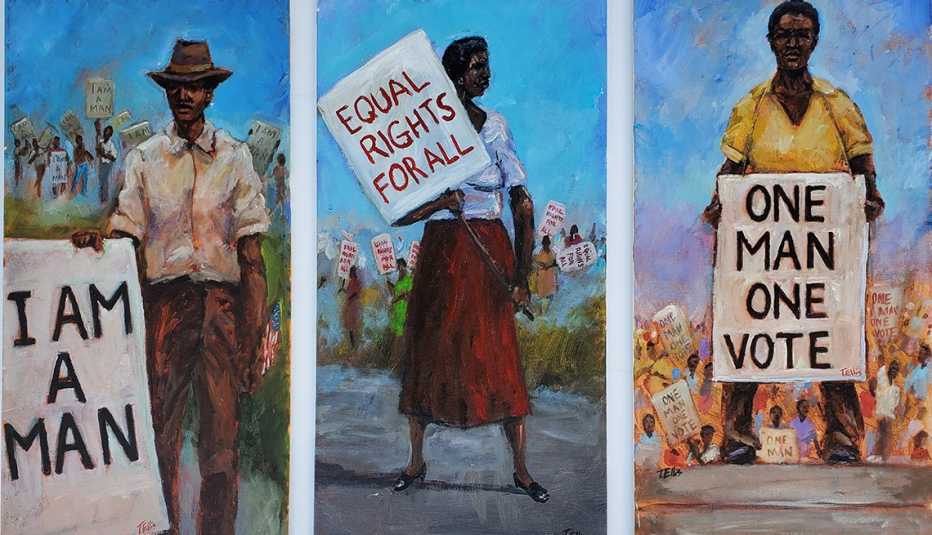Staying Fit


From the moment the first abducted Africans found themselves enslaved and oppressed on America's shores, freedom became their singular ambition. And through the centuries, for their children and their children's children, that most human desire remained constant and basic: They demanded freedom from bondage and the atrocities of rape, beatings and family separations. Freedom from lynching and political disenfranchisement. Freedom from segregation, redlining, police brutality, discrimination. Freedom, finally, from all the effects of racial hatred, which has long distorted our nation's democratic ideals.
Over the summer, the nationwide protests spurred by the killings of George Floyd, Breonna Taylor and Ahmaud Arbery gave renewed urgency to those calls. They also underscored the grinding nature of progress, for despite the civil rights gains of previous generations, formidable work remains to be done. Yet as our history has shown, Black thinkers and activists —from the poorest of the poor to those with great power and means — have been critical in challenging America to do this work. Their voices mattered.


AARP Membership— $12 for your first year when you sign up for Automatic Renewal
Get instant access to members-only products and hundreds of discounts, a free second membership, and a subscription to AARP the Magazine.
Their words — some reflected here — express deep outrage and suffering but also tremendous love and hope for their community and their country. Some of their calls for justice have been answered through legislation or litigation; other demands remain painfully timely. Together, they offer a powerful opportunity to honor the past while working together to create a better, more just future for all.
Activists on Justice
Then: 1964
Until the killing of black men, black mothers’ sons, becomes as important to the rest of the country as the killing of a white mother's son, we who believe in freedom cannot rest.
—Ella Baker, civil rights activist
Now: 2020
Every police killing of an un-armed black man, woman or child damages our country. ... These killings are a tragedy for families and communities. But they are also a stain on our nation's very soul.
—Sherrilyn Ifill, president, NAACP Legal Defense and Educational Fund
O, ye nominal Christians! … Is it not enough that we are torn from our country and friends, to toil for your luxury and lust of gain? … Why are parents to lose their children, brothers their sisters, or husbands their wives? Surely this is a new refinement in cruelty … and adds fresh horrors even to the wretchedness of slavery.
—Olaudah Equiano, former enslaved person, 1789
I had reasoned this out in my mind; there was one of two things I had a right to: liberty, or death; if I could not have one, I would have the other; for no man should take me alive.
—Harriet Tubman, abolitionist, a leader of the Underground Railroad, 1868
My race needs no special defense, for the past history of them in this country proves them to be equal of any people anywhere. All they need is an equal chance in the battle of life.
—Robert Smalls, U.S. congressman, 1895
Activists on the Right-to-Vote
Then: 1865
I am for the “immediate, unconditional, and universal” enfranchisement of the black man, in every State in the Union. Without this, his liberty is a mockery; without this, you might as well almost retain the old name of slavery for his condition.
—Frederick Douglass, former enslaved person, abolitionist, author, activist
Now: 2020
The struggle continues. After the 15th Amendment recognized the African American right to vote in 1870, some states responded by using violent intimidation, poll taxes and literacy tests as barriers to voting. Today those laws have mutated into voter suppression efforts that target low income and minority communities with disheartening effectiveness. I fight for the real enfranchisement of black people.
—Eric Holder Jr., former U.S. attorney general
It is a peculiar sensation, this double consciousness, this sense of always looking at one's self through the eyes of others. … One ever feels his twoness — an American, a Negro; two souls, two thoughts, two unreconciled strivings; two warring ideals in one dark body, whose dogged strength alone keeps it from being torn asunder.
—W.E.B. Du Bois, sociologist, historian, activist, 1897
Our watchword has been “the land of the free and the home of the brave.” Brave men do not gather by thousands to torture and murder a single individual, so gagged and bound he cannot make even feeble resistance or defense. Neither do brave men and women stand by and see such things done without compunction of conscience, nor read of them without protest.
—Ida B. Wells-Barnett, political journalist, teacher, 1900
The chasm between the principles upon which this Government was founded ... and those which are daily practiced under the protection of the flag, yawns so wide and deep.
—Mary Church Terrell, clubwoman, businesswoman, activist, 1906

































































More on Jusice and Civil Rights
How to Have a Respectful Conversation About Racial Justic
7 expert tips on approaching difficult or uncomfortable discussions
Marching for Social Justice
How older Americans are demanding change7 Leaders Who Carry on Martin Luther King Jr.'s Legacy
These modern trailblazers continue to work on civil rights issues